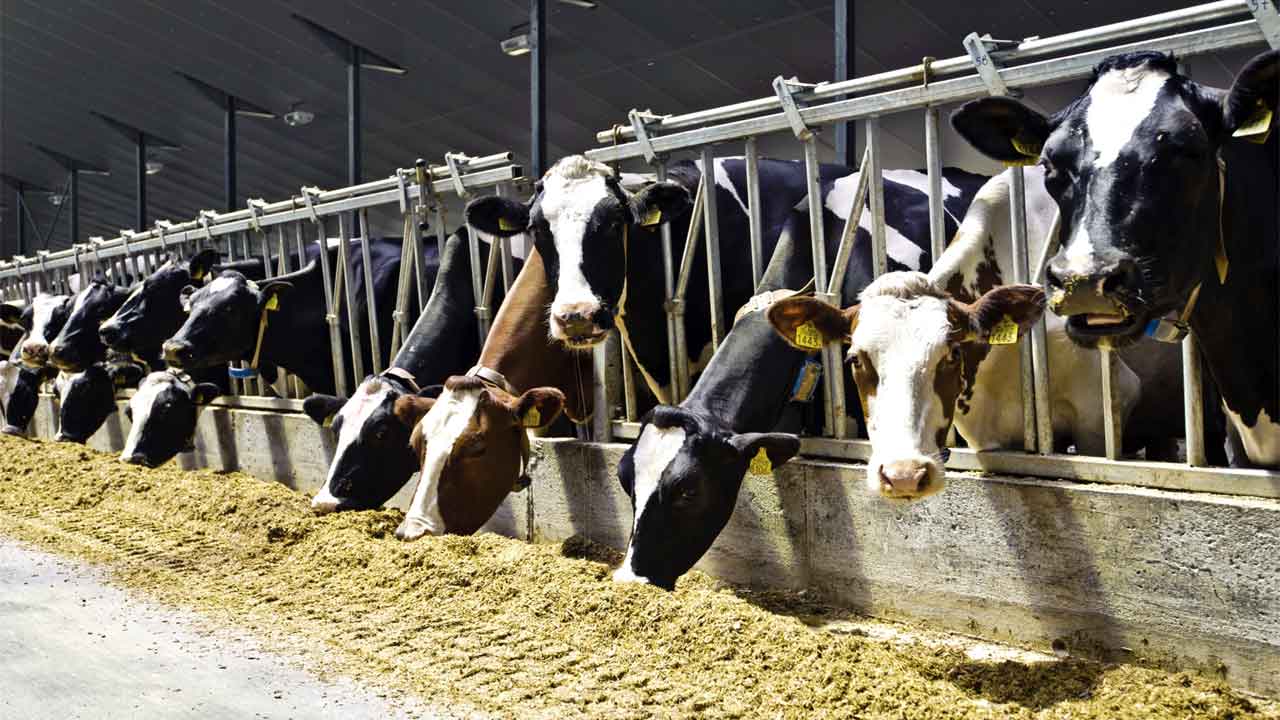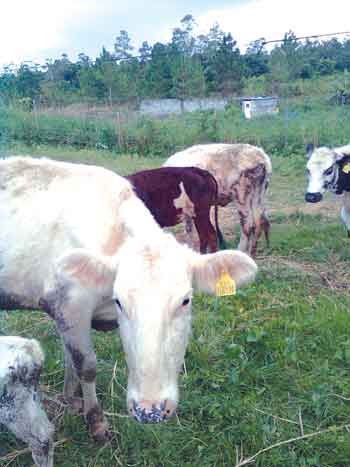
The recent foot and mouth outbreak in Rodrigues has quickly found its way to Mauritius. While local breeders welcome the measures taken by the Ministry of Agriculture to counter the disease, the breeders in Rodrigues are expecting some kind of compensation from the government following heavy losses of stock.
The culling of cattle heads affected by the foot and mouth disease that broke out in Rodrigues will have devastating socioeconomic consequences on the livestock sector in both Mauritius and Rodrigues. The outbreak will also affect cattle importers and meat consumers.
Adil Sohawon: “We need modern laboratories”
Adil Sohawon, Secretary of the Cow Breeders Cooperative Society Ltd, based in Nouvelle Découverte, a small village near St Pierre, told News on Sunday that it is high time the country invests in modern laboratory facilities for the food and cattle breeding sector. “The government should also reorganise the veterinary services to adapt it to new trends in the sector. Today, we are talking of modern farming methods and yet we are still sending samples abroad for analysis and then wait for days, if not weeks, for the results. Mauritius should have these facilities here. The veterinary services already have qualified staff, but unfortunately they lack the necessary tools and resources to deliver efficiently. They must be upgraded to ensure better service so that the sector emerges. There are seven types of this disease and we need to find out the type which is recurrent in Mauritius so as to counter it efficiently,” he told us. Adil Sohawon added that fortunately the local stock has been spared as the disease is affecting animals imported from Rodrigues, which were already infected prior to arrival. “However, local breeders are worried that the disease may spread fast. I am satisfied with the measures taken by the Ministry of Agriculture, especially the quick order of vaccines. We hope the disease will be contained and eliminated; otherwise it will be disastrous to local breeders. We will incur heavy losses and this will also affect the dairy industry,” he said.
The disease started in Rodrigues, where about 420 cases of infected animals were initially reported to veterinary services last week. There had also been about 60 cases of dead animals. Cattle, sheep and even pigs were victims of the disease. The authorities immediately took necessary measures to contain the disease and prevent it from further spreading. It was decided to cull the worst affected animals. However, the disease had already reached the shores of Mauritius. This happened with the arrival of animals from Rodrigues and suspected cases were detected in two farms in Mauritius, namely at Richelieu and Vallée des Prêtres. Imported animals have thus been put in quarantine and the necessary tests were done. The Ministry of Agriculture announced that it is monitoring those farms.
There is now a temporary ban on the import of animals and of meat from Rodrigues because it has been established that the outbreak in Mauritius originates from Rodrigues, where the situation has been worsening such that the Rodrigues Regional Assembly has declared the whole of the island as quarantine zone. Breeders expect compensation from the government. While no figure has been announced yet, it is likely that an amount of between Rs 35,000 and Rs 40,000 be paid per cattle head lost, an amount which reflects the price of an animal. However, the authorities have not yet decided on this, their priority being to contain the epidemic. In this context, an urgent order of 10,000 doses of vaccines has already been placed with a laboratory in Botswana in order to protect the remaining stock in Mauritius. The Minister of Agriculture stated in Parliament on Tuesday that a decision will be taken today, Friday, by the cabinet, regarding payment of compensation.
The situation is more dreadful for cattle importers in Mauritius, especially given that the Eid Ul Adha festival is approaching. Importers who have already taken deposits will now have to refund buyers since no more import will be allowed from Rodrigues.
Boosting the livestock industry
In the 2016/2017 Budget, the Finance Minister, Pravind Jugnauth had announced a series of measures for the agricultutal sector, including livestock breeding. The main ones are as follows:
- Setting up of a heifer farm at Melrose
- Provision of Rs 10 million as support funding for industrial milk processors
- Pig sector: 50% of outstanding balances on loans, including interest due contracted by pig breeders will be waived, if paid before 30 June 2017
- Outstanding interests on start up loans taken by planters, breeders and fishermen contracted prior to 1st July 2012 will be waived
- Exemption from payment of corporate tax on all non sugar agricultural activities for cooperative societies
- Extension of the list of equipment falling under the VAT refund scheme for small planters
- Setting up of a contributory insurance scheme for non-sugar crops
A 24/7 job
Cattle breeding is a 24/7 job, as it is labour intensive. In the past, mainly women were engaged in cattle breeding. This traditional activity was necessary to provide families with milk. Surplus production was sold. Selling of calves and bulls also generated income for poor families. In rural areas in the past, almost all families owned either a cow or a goat. Milking was done mainly manually, and animals were fed with cane tops and grass. Manufactured animal feed was almost unheard of. It was only in 1977 that the first feed factory started its operations in the country.
In figures
In 2015, production of beef was about 2,013 tonnes in Mauritius, compared to 1,956 in 2014. Meat production from goat was only 42 tonnes in 2015. On the other hand, the country imported meat and meet products to the tune of Rs 2.3 billion in 2014, a rise of Rs 200 million compared to 2013. The volume of meat and meat products imports was 16,000 tonnes in 2014, against 17,000 tonnes in 2013.
FMD: God to know
Foot-and-mouth disease (FMD) is a severe, highly contagious viral disease of cattle and swine. It also affects sheep, goats, deer, and other cloven-hooved ruminants. The disease spreads very quickly if not controlled. It is caused by a virus of which there are seven ‘types’, each producing the same symptoms, and distinguishable only in the laboratory.
The interval between exposure to infection and the appearance of symptoms varies between twenty-four hours and ten days, or even longer. The average time, under natural conditions, is three to six days. The virus can persist in contaminated fodder and the environment for up to one month, depending on the temperature and pH conditions. Airborne spread of the disease can take place and under favourable weather conditions, the disease may be spread considerable distances by this route.
Animals pick up the virus either by direct contact with an infected animal or by contact with foodstuffs or other things which have been contaminated by such an animal, or by eating or coming into contact with some part of an infected carcass. Affected animals will recover. However because of the loss of production and the infectious state of the disease, infected animals are usually culled. FMD is one of the most difficult animal infections to control. FMD outbreaks are usually controlled by quarantines and movement restrictions, euthanasia of affected and in-contact animals, and cleansing and disinfection of affected premises, equipment and vehicles.
Infected carcasses must be disposed of safely by incineration, rendering, burial or other techniques. Milk from infected cows can be inactivated by heating to 100°C (212°F) for more than 20 minutes. Slurry can be heated to 67°C (153°F) for three minutes. Vaccination can be used to reduce the spread of FMD or protect specific animals. Vaccines are also used in endemic regions to protect animals from clinical disease. FMD vaccines must closely match the serotype and strain of the infecting strain.
Vaccination with one serotype does not protect the animal against other serotypes, and may not protect the animal completely or at all from other strains of the same serotype. Currently, there is no universal FMD vaccine.
 Restrict movement to prevent spread
Restrict movement to prevent spread
A local breeder, who is also a member of the Royal Association of British Dairy Farmers (RABDF), explains that the foot and mouth disease spreads rapidly. “The disease can also be spread by people, vehicles and other objects such as clothing or shoes that have been contaminated by the virus. With the Eid Ul Adha festival approaching, it is common for families to visit farms to choose animals for the prayers to be followed by the sacrifice. People often visit several farms in one day and this practice should be avoided, as they may spread the virus via contaminated shoes or clothing or vehicles from one farm to another. Breeders should also restrict access to their farms to protect their animals, as farms are not leisure parks for public entertainment. In some farms, visitors are asked to disinfect their shoes. It is also impossible to control the movement of trucks that service various farms, so truck drivers should take the necessary precautions.”
 J'aime
J'aime














